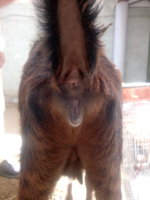aisha3789
Exploring the pasture
Got this doe 6 weeks ago and the owner didnt give any information. Not sure if she was bred or not. She never came in heat in this six weeks. We have a young buck with her and he tries to mount her. A friend said she might be a freemartin. Her anatomy looks normal to me. What do you think?

